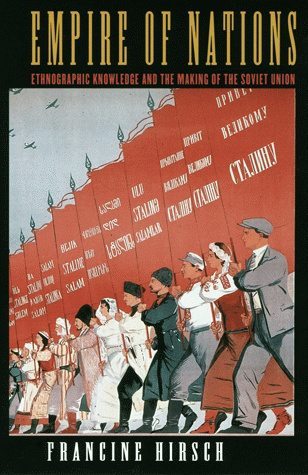Número de ficha: 140590
Me gusta
0
No me gusta
0
Para calificar el registro, es necesario acceder al sistema.
Ir a la página de acceso
- ISBN
- 978-0-8014-4273-5
- Clasificación DEWEY
- 323.1470904 HIR-e
- Autor
- Hirsch, Francine 1967- , autor
- Título
- Empire of nations : ethnographic knowledge & the making of the Soviet Union / Francine Hirsch
- Pie de imprenta
- Ithaca London : Cornell University Press , 2005
- Descripción
- xviii, 367 páginas : ilustraciones, mapas ; 24 cm.
- Tipo de medio digital o análogo
- sin medio rdamedia
- Medio de almacenamiento
- volumen rdacarrier
- Serie
- Culture & Society After Socialism
- Bibliografía
- Incluye referencias bibliográficas (páginas 337-354) e índice
- Nota de Resumen
- When the Bolsheviks seized power in 1917, they set themselves the task of building socialism in the vast landscape of the former Russian Empire, a territory populated by hundreds of different peoples belonging to a multitude of linguistic, religious, and ethnic groups. Before 1917, the Bolsheviks had called for the national self-determination of all peoples and had condemned all forms of colonization as exploitative. After attaining power, however, they began to express concern that it would not be possible for Soviet Russia to survive without the cotton of Turkestan and the oil of the Caucasus. In an effort to reconcile their anti-imperialist position with their desire to hold on to as much territory as possible, the Bolsheviks integrated the national idea into the administrative-territorial structure of the new Soviet state. In Empire of Nations, Francine Hirsch examines the ways in which former imperial ethnographers and local elites provided the Bolsheviks with ethnographic knowledge that shaped the very formation of the new Soviet Union. The ethnographers—who drew inspiration from the Western European colonial context—produced all-union censuses, assisted government commissions charged with delimiting the USSR's internal borders, led expeditions to study "the human being as a productive force," and created ethnographic exhibits about the "Peoples of the USSR." In the 1930s, they would lead the Soviet campaign against Nazi race theories . Hirsch illuminates the pervasive tension between the colonial-economic and ethnographic definitions of Soviet territory; this tension informed Soviet social, economic, and administrative structures. A major contribution to the history of Russia and the Soviet Union, Empire of Nations also offers new insights into the connection between ethnography and empire.
- Fuente de adquisición
- Gobi ; compra ; 26-07-2018
- Materia
- Etnología -- Unión Soviética
- Minorías -- Política y Gubernamental -- Unión Soviética
- Materia Nombre Geográfico
- Unión Soviética -- Relaciones Étnicas
- Unión Soviética -- Política y Gobierno
| etiq. | info |
|---|---|
| 001 | 13853616 |
| 005 | 20170310160950.0 |
| 006 | a |
| 008 | 180730s2005 nyuab rb 001 0 eng |
| 020 | |a978-0-8014-4273-5 |
| 035 | |a140590 |
| 040 | |aDLC|bspa|cDLC|dDLC |
| 082 | 00|a323.1470904|bHIR-e |
| 100 | 1 |aHirsch, Francine|d1967-|eautor |
| 245 | 10|aEmpire of nations|bethnographic knowledge & the making of the Soviet Union |cFrancine Hirsch |
| 260 | |aIthaca |aLondon|bCornell University Press|c2005 |
| 300 | |axviii, 367 páginas|bilustraciones, mapas|c24 cm. |
| 336 | |atexto|2rdacontent |
| 337 | |asin medio|2rdamedia |
| 338 | |avolumen|2rdacarrier |
| 490 | 1 |aCulture & Society After Socialism |
| 504 | |aIncluye referencias bibliográficas (páginas 337-354) e índice |
| 520 | |aWhen the Bolsheviks seized power in 1917, they set themselves the task of building socialism in the vast landscape of the former Russian Empire, a territory populated by hundreds of different peoples belonging to a multitude of linguistic, religious, and ethnic groups. Before 1917, the Bolsheviks had called for the national self-determination of all peoples and had condemned all forms of colonization as exploitative. After attaining power, however, they began to express concern that it would not be possible for Soviet Russia to survive without the cotton of Turkestan and the oil of the Caucasus. In an effort to reconcile their anti-imperialist position with their desire to hold on to as much territory as possible, the Bolsheviks integrated the national idea into the administrative-territorial structure of the new Soviet state. In Empire of Nations, Francine Hirsch examines the ways in which former imperial ethnographers and local elites provided the Bolsheviks with ethnographic knowledge that shaped the very formation of the new Soviet Union. The ethnographers—who drew inspiration from the Western European colonial context—produced all-union censuses, assisted government commissions charged with delimiting the USSR's internal borders, led expeditions to study "the human being as a productive force," and created ethnographic exhibits about the "Peoples of the USSR." In the 1930s, they would lead the Soviet campaign against Nazi race theories . Hirsch illuminates the pervasive tension between the colonial-economic and ethnographic definitions of Soviet territory; this tension informed Soviet social, economic, and administrative structures. A major contribution to the history of Russia and the Soviet Union, Empire of Nations also offers new insights into the connection between ethnography and empire. |
| 541 | |aGobi|ccompra|d26-07-2018 |
| 598 | |aCER |
| 598 | |aJULIO2018 |
| 650 | 4|aEtnología|zUnión Soviética |
| 650 | 4|aMinorías|xPolítica y Gubernamental|zUnión Soviética |
| 651 | 4|aUnión Soviética|xRelaciones Étnicas |
| 651 | 4|aUnión Soviética|xPolítica y Gobierno |
